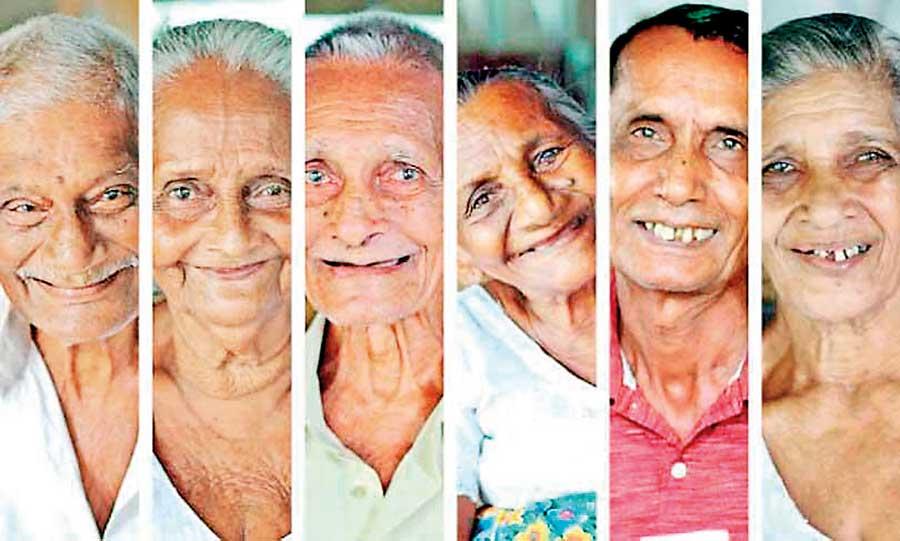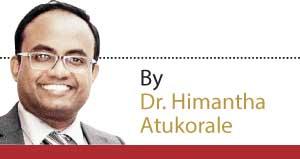18 Apr 2022 - {{hitsCtrl.values.hits}}

Sri Lanka lacks an established government-sponsored mechanism to address the needs of senior citizens. Earlier we had an impressive life expectancy at birth rate, one of the highest for a South Asian country. Nowadays, the level of competition for vital items is astounding. When resources are scarce, the old and feeble are deprived of the bare essential commodities and services for survival. In the long run, declining health in the elderly will place an increased stress on the extended family framework upon which we rely so heavily for geriatric care.
we had an impressive life expectancy at birth rate, one of the highest for a South Asian country. Nowadays, the level of competition for vital items is astounding. When resources are scarce, the old and feeble are deprived of the bare essential commodities and services for survival. In the long run, declining health in the elderly will place an increased stress on the extended family framework upon which we rely so heavily for geriatric care.
"Deaths within infamous queues are simply a glimpse of elderly individuals’ diminished abilities to compete for life’s necessities. We do not have statistics on health problems that deteriorated as a result of queuing. Nor do we have data on disabled adults who choose not to queue"
Limited resources and cost cutting
Deaths within infamous queues are simply a glimpse of elderly individuals’ diminished abilities to compete for life’s necessities. We do not have statistics on health problems that deteriorated as a result of queueing. Nor do we have data on disabled adults who choose not to queue. It is a well-known fact that older adults lack the ability to compete in an environment where demand vs supply has gone awry.
Within extended or even nuclear families, expenditure has been lowered to cover the minimal necessities. It has been demonstrated through study that during a famine, nutritious food is prioritized for children above the elderly. Even money that formerly spent on medication may suddenly be viewed as a waste and allocated to things like schooling and transportation fees. With the rising cost of fuel and medicine, this situation may deteriorate further, with potentially dire long-term effects. Recently I have noticed a dramatic decline in health seeking behaviour as transportation costs have increased.
Most of the geriatric patients that we encounter have disabilities. They have mobility issues, problems in memory (dementia), reduced vision and also psychiatric conditions including depression. All these factors put them at a disadvantage during an economic recession.
"Last year’s budget allocation for defence was 15% and whereas for health it was 6% out of total government expenditure. Within that health allocation more emphasis is provided to paediatric and maternal sectors but not for elderly care"
Inability to seek employment
To make ends meet amid a financial crisis, the majority of elderly persons in Sri Lanka are expected to employ themselves. That “extra cash” requirement is seen as a nearly impossible goal to achieve. There is stiff competition within the job market and the “elderly newcomers” are not accepted.
I meet elderly female patients who are self-employed. A certain segment prepare food to be sold at shops. However, with cooking fuel and food prices skyrocketing, the majority of them have abandoned this practice.
"When the country is facing economic hardships, geriatric population suffer the most. Bereavement due to medicine scarcity may be unpleasant for close-knit families. The frustration might further destabilise an economically shaken family"
Psychological dilemma
Economic collapse with no end in sight results in widespread discontent. Food, clothes, and stationary scarcity all contribute to family discord. Certain elderly members of these households will bear the brunt of all blame.
Unaddressed flares of previous psychological illnesses should be anticipated within the geriatric population. Screening adults for these and providing therapy/ treatment will be challenging during trying times. Certain unique research publications done in the west during COVID-19 lockdown era revealed that older adults were subjected to physical harassment. Similar incidents may occur during current crises.
"Even money that formerly spent on medication may suddenly be viewed as a waste and allocated to things like schooling and transportation fees. With the rising cost of fuel and medicine, this situation may deteriorate further, with potentially dire long-term effects"
Budget allocation for wellbeing of the elderly
Last year’s budget allocation for defence was 15% and whereas for health it was 6% out of total government expenditure. Within that health allocation more emphasis is provided to paediatric and maternal sectors but not for elderly care. If I compare this with a developed country US spends well over 16%, Germany 11%, Cuba 11% and even Afghanistan 13% for health care. Due to a low health care allotment screening for emerging medical conditions is hampered.
When the country is facing economic hardships, geriatric population suffer the most. Bereavement due to medicine scarcity may be unpleasant for close-knit families. The frustration might further destabilise an economically shaken family. Unless immediate attention is provided to improve the wellbeing of the elderly, through screening, identifying and treating those who are having medical issues, soon we may soon reach a point of no return.
(The writer of this article is a Consultant in Rheumatology and Rehabilitation - General Hospital, Matara)
27 Nov 2024 1 hours ago
27 Nov 2024 2 hours ago
27 Nov 2024 2 hours ago
27 Nov 2024 3 hours ago
27 Nov 2024 3 hours ago